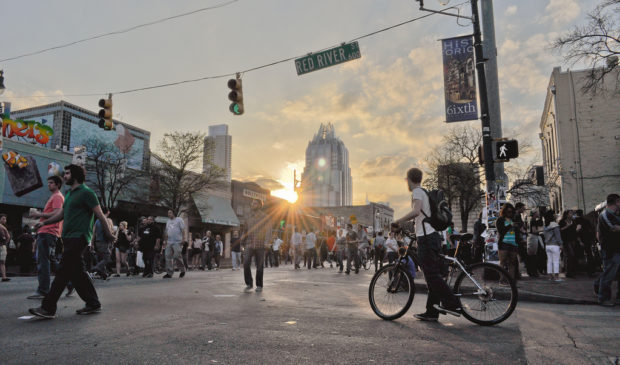City lands $10 million “minibond” agreement to save endangered music venues
Friday, September 23, 2016 by
Chad Swiatecki The city of Austin will team up with private investors to save some of the city’s most iconic — and increasingly economically distressed — music venues through a new program announced prior to Thursday’s City Council meeting.
Mayor Steve Adler announced the forthcoming creation of a $10 million municipal “minibond,” the creation of which will be facilitated by Neighborly, a startup that allows private investors to buy into the $3.7 trillion municipal bond market. Austin’s proposal to help protect endangered music venues was announced as one of five winners of the Neighborly Bonds Challenge, which results in no bond issuance fees and a suite of marketing, administrative and legal support worth $100,000.
Preserving music venues facing increasing rents as downtown core property values rise was one of the priorities of the city’s Music & Creative Ecosystem Omnibus. Adler introduced that plan in early 2016 in the hopes of stemming job losses and a general weakening of Austin’s music economy, one of the main concerns of which was the rent increases and development threats faced by music venue owners.
The bond fund will be composed of completely private investments and overseen by investors. No details were disclosed on Thursday about how the fund would select which venues to target for purchase. A parallel program announcement suggests that the stretch of clubs along Red River and Seventh streets is something of a priority for all concerned with Austin’s music health. That region is known as the Red River Cultural District, and the city’s Economic Development Department announced it is finalizing an agreement with the Urban Land Institute to run a four-month technical assistance panel on the area.
Christine Maguire, who is the manager of the Economic Development Department redevelopment division, said that effort would help improve the business fundamentals of what is seen as the most important cluster of live music clubs for the city’s music culture, which plays a huge role in attracting new residents and economic development. Maguire said the goal of the ULI initiative is to help clubs in the district have a more favorable business environment in time for South by Southwest in March, a nearly two-week period that sees most downtown clubs earn a sizable portion of their yearly revenue.
The Red River area is set to become a development hotspot over the next decade with the creation of an innovation district related to the Dell Medical School and the civic improvements tied to the Waller Creek Tunnel project.
Some form of public-private partnership to create more favorable real estate conditions for club owners had long been a goal of proponents of Austin music, but the difficulty and risk of utilizing taxpayer dollars for many small land deals had proved to be a stumbling block.
Adler stressed Thursday that the Neighborly program will involve $10 million in private investment into a municipal bond, with no exposure for taxpayers or direct city involvement in investment or purchasing decisions.
The exact mechanism by which purchasing decisions would be made is still to be determined, but various models that have been suggested through the years involved community-minded investors pitching in to buy properties that house clubs, without hope for redevelopment or a profit-first mindset that would drive rents to unsustainable levels.
Don Pitts, manager of the city’s music and entertainment division, said the Neighborly minibond represents the strongest move yet to “move the needle” on the city’s goal of preserving music venues. He pointed to the work of the London Music Board as an example of an ambitious response to displacement of music venues that Austin could model.
“We’ve been lacking in big ideas like this that can have a larger impact,” he said. “The roles have not been defined yet, but we’ll be happy to work in whatever way we can.”
Pitts said prominent business owners who have been vocal music supporters in the past would make for likely candidates to take large investment positions in the city’s fund, but he wouldn’t single out any names this early in the process.
Graham Williams, a partner in the Sidewinder nightclub on Red River Street and concert promoter at venues all over Austin, said he looks forward to learning more about how the Neighborly minibond would work and praised the emphasis Adler has placed on strengthening Austin’s music ecosystem.
“When I see the challenges on Red River, it’s come because things have changed so much and downtown live music clubs are mostly a labor of love that no one is getting rich from,” he said. “The big question isn’t so much how can we get more (investment) money, but how can we operate with the constant new rules and restrictions being passed on businesses that are already struggling.”
Photo by Davidlohr Bueso made available through a Creative Commons license.
The Austin Monitor’s work is made possible by donations from the community. Though our reporting covers donors from time to time, we are careful to keep business and editorial efforts separate while maintaining transparency. A complete list of donors is available here, and our code of ethics is explained here.
You're a community leader
And we’re honored you look to us for serious, in-depth news. You know a strong community needs local and dedicated watchdog reporting. We’re here for you and that won’t change. Now will you take the powerful next step and support our nonprofit news organization?






